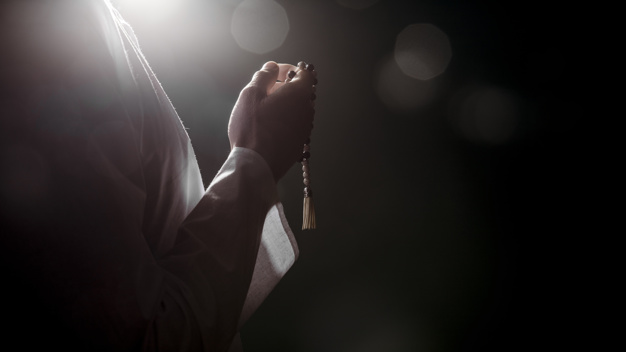How to Pay Off Obligatory Prayers and Its Explanation
This is how to pay off obligatory prayers and its explanation that you can learn.

Kapanlagi.com - The month of Dhu al-Hijjah is a moment for Muslims to seek blessings, one of which is to observe Dhu al-Hijjah fasting in the first nine days. The Prophet Muhammad indeed advised his people to do many righteous deeds in the month of Dhu al-Hijjah. The rewards are equivalent to those who die as martyrs in the battlefield.
Narrated by Ibn 'Abbas RA, the Prophet Muhammad said, "There are no days in which righteous deeds are more beloved to Allah than these days, meaning the first ten days of Dhu al-Hijjah."
READ ALSO: Learn the Law and Procedures of Aqiqah for Parents
Then, the companions asked, "Even if it is jihad in the cause of Allah, O Messenger of Allah?" The Prophet Muhammad answered, "Even if it is jihad in the cause of Allah, except for someone who goes out (jihad in the cause of Allah) with himself and his wealth and does not return."
In addition to Dhu al-Hijjah fasting, there are other important worship practices to be performed in this month, such as Hajj, Qurbani (sacrifice), charity, and remembrance of Allah. Anyone has the opportunity to worship in various forms. However, if Muslims are unable to perform Hajj or Qurbani, they can observe Dhu al-Hijjah fasting and other deeds according to their ability.
Here is some information about Dhu al-Hijjah fasting that may strengthen your hearts in worship.

Illustration (Credit: Freepik)
The first ten days of the month of Dzulhijjah are special days. Various types of worship are gathered in these days, which can be combined into one period that is not possessed by other months. Among them are prayers, fasting in Dzulhijjah, charity (sacrifice), and Hajj.
This Hajj worship cannot be obtained in other months. The first ten days of Dzulhijjah are important moments that Allah used to swear in Surah Al-Fajr
"By the dawn (1) And [by] ten nights (2)."
Thus said by Ibn Abbas, Ibn Zubair, Mujahid, and a number of early scholars and contemporary scholars in response to the ten nights referred to in this verse are the first ten nights of the month of Dzulhijjah.
Quoted from muslim.or.id, Ibn Muflih in Al Furu' which is a book of Hanbali school, said that,
"It is recommended to fast on the first ten days of Dzulhijjah, especially on the ninth day, which is the day of Arafah. This is agreed upon by the scholars."
It is truly inappropriate if someone says that there is no evidence for fasting in Dzulhijjah. The general hadith marfu' above is sufficient as the basis for fasting for 9 days in Dzulhijjah, where the Prophet encouraged his ummah to do righteous deeds.

Illustration (Credit: Freepik)
If you are looking for information on how to perform fasting in Dhu al-Hijjah, please refer to the following explanation.
1. Intention for fasting from the 1st to the 7th of Dhu al-Hijjah
Nawaitu shouma syahri dzil hijjah sunnatan lillahi ta'ala
Meaning, "I intend to fast the voluntary fasting of the month of Dhu al-Hijjah for the sake of Allah Ta'ala"
2. Intention for fasting on the 8th of Dhu al-Hijjah, known as Tarwiyah fasting
Nawaitu shouma tarwiyata sunnatan lillahi ta'ala
Meaning, "I intend to fast the voluntary Tarwiyah fasting for the sake of Allah Ta'ala"
3. Intention for fasting on the 9th of Dhu al-Hijjah, known as Arafah fasting
Nawaitu shouma arafata sunnaatan lillahi ta'ala
Meaning, "I intend to fast the voluntary Arafah fasting for the sake of Allah Ta'ala"
4. Procedures for fasting in Dhu al-Hijjah
The procedures for fasting in Dhu al-Hijjah are the same as the mandatory fasting in the month of Ramadan, as follows:
- Begin with the intention to fast
- Have sahur (pre-dawn meal) before the Fajr prayer call
- Abstain from eating, drinking, and fulfilling desires
- Break the fast at the time of the Maghrib prayer call

Illustration (Credit: Freepik)
The command to fast in Dhu al-Hijjah has been explained above. Furthermore, you also need to know information about the virtue of the month of Dhu al-Hijjah. Based on information cited from islami.co, there are three special days within the first ten special days of the month of Dhu al-Hijjah, namely the 8th of Dhu al-Hijjah known as yaumu tarwiyah, the 9th of Dhu al-Hijjah known as yaumul 'arafah, and the 10th of Dhu al-Hijjah known as yaumun nahr.
Although these three days are special, the other seven days are still extraordinary because of their significant historical events.
Historically, Ibn Abbas once explained that throughout history, the days in the first ten days of Dhu al-Hijjah are meaningful days because various significant events occurred that are related to the subsequent changes in human life.
The first day of Dhu al-Hijjah is the day when Prophet Adam was forgiven by Allah SWT, after he had asked for forgiveness for eating the forbidden fruit in paradise. Therefore, the Prophet Muhammad once said:
"Whoever fasts on the first day of the month of Dhu al-Hijjah, Allah will forgive his sins as He forgave the sins of Prophet Adam."
The second day of Dhu al-Hijjah is the day when Prophet Yunus was saved by the fish Nun after spending several days in its belly while continuously glorifying and worshiping Allah SWT. It was on this day that Prophet Yunus was allowed to come out of the belly of the fish Nun. That is why the Prophet Muhammad once said:
"Whoever worships on the second day of the month of Dhu al-Hijjah will receive rewards similar to the rewards of one year of worship without any disobedience."
The third day of Dhu al-Hijjah is the day when the prayer of Prophet Zakariya was granted, and he was blessed with a son named Yahya. As for the fourth day of Dhu al-Hijjah, it is the birthday of Prophet Isa (Jesus), peace be upon him. The fifth day of Dhu al-Hijjah is the birthday of Prophet Musa (Moses), peace be upon him. The sixth day of Dhu al-Hijjah is the days of victory for the Prophets in their struggle for the teachings of monotheism. The seventh day of the month of Dhu al-Hijjah is the closing day of the gates of Hellfire. Therefore, the Prophet Muhammad, peace be upon him, once said:
Whoever fasts on the seventh day of the month of Dhu al-Hijjah, thirty difficulties in his life will be closed, and thirty doors of ease will be opened for him.
As for the eighth day, which is called the day of Tarwiyah, among the virtues that are well-known for those who fast on the day of Tarwiyah, they will receive a great reward, the magnitude of which only Allah knows for certain.
That is the explanation of the month of Dhu al-Hijjah and the fasting procedure of Dhu al-Hijjah, which you can refer to in order to gain enlightenment before performing the worship.
(kpl/ans)
Cobain For You Page (FYP) Yang kamu suka ada di sini,
lihat isinya
This is how to pay off obligatory prayers and its explanation that you can learn.
Here are 7 activities that can be done at home during Lebaran. Let's check them out KLovers.
These are 7 healthy drink ideas suitable for serving during Eid amidst the Covid-19 pandemic. Let's check it out KLovers.
Making vegetable pickle is considered very easy and simple. Let's check out the following vegetable pickle recipes, KLovers!
This is the danger of weight gain, these are 7 Tips for Managing Eating Patterns After Ramadan Fasting. Let's check it out KLovers.
Not only becoming a loser, leaving the five daily prayers also has a great sin because it is a mandatory worship. Check out the following explanation KLovers.
Here is the etiquette and intention of slaughtering chickens and its explanation in Islam that you can learn about.
Here are some simple to traditional Balinese plecing kangkung recipes that stimulate the appetite.
Here are 6 tips to keep children healthy at the end of Ramadan fasting. Let's check it out, KLovers.
Here are some practical purple sweet potato recipes, delicious homemade dishes that you can try.
No need to go all the way to Medan to enjoy bika ambon. You can make it yourself by following various bika ambon recipes.
There are several spinach vegetable recipes that can be made, starting from spinach salad, gado-gado, spinach chips, or clear spinach soup. Let's check out the review, KLovers!